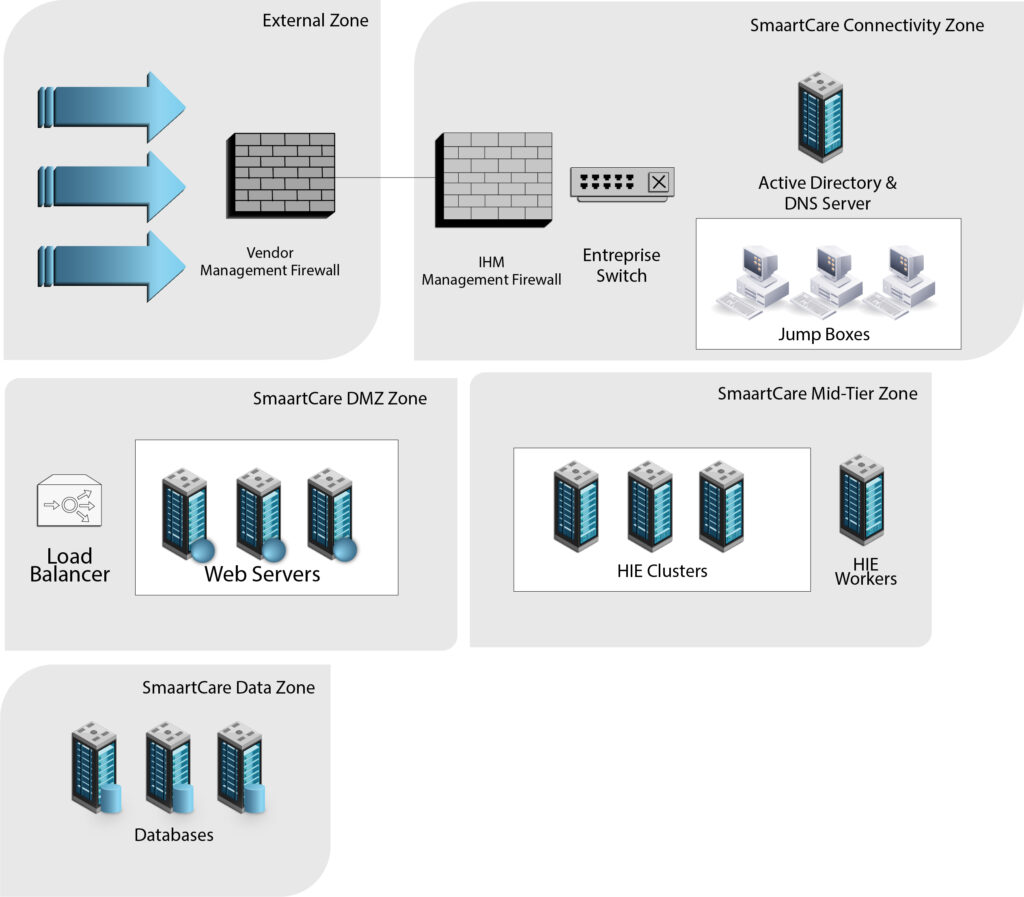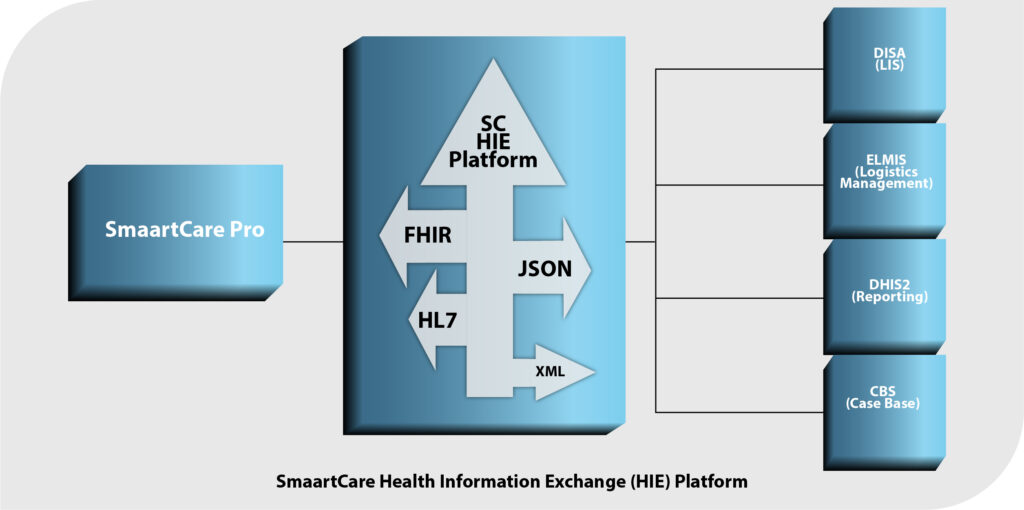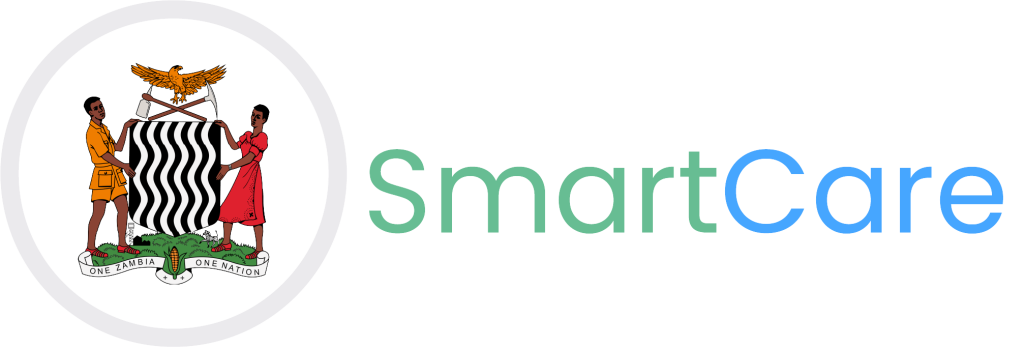SmartCare/DISA Integration Live!
The SmartCare and DISA Lab integration has been activated, aiming to improve the efficiency of lab test processing and result delivery in Zambia.
SmartCare PRO Deployed to 1000+ sites
SmartCare Pro has successfully been deployed to over 750 sites across the country in 2024 as part of a phased approach. This strategic rollout aims to achieve saturation in ten provinces, enhancing healthcare delivery and streamlining patient management across the provinces
Data Access Portal
The National Health Data Access Portal is empowering users to monitor disease prevalence and identify trends in disease spread through a comprehensive data visualization framework.

SmartCare Pro is the latest iteration of Zambia's national Electronic Health Record (EHR) system, following its predecessors, SmartCare Legacy and SmartCare Plus. The system is a homogeneous, standardized EHR deployed across Zambia’s healthcare facilities, ensuring seamless interoperability and data sharing nationwide. By centralizing patient information, it optimizes healthcare delivery, reduces inefficiencies, and enables real-time decision-making across all levels of care. Designed for both efficiency and effectiveness, it incorporates advanced features like integrated clinical guidelines to support informed decision-making, rapid reporting capabilities, and specialized tools for tracking critical health metrics.
SmartCare Pro Architecture
SmartCare Pro is a web-based application designed using an n-tier architecture, which includes an application layer, a business layer, and a data layer. The application layer handles the front-end, the business layer manages business rules, and the data layer deals with database operations. These layers are decoupled, meaning changes in one layer do not affect the others. This design follows object-oriented programming principles, ensuring that any changes made in one layer, especially the business layer, do not disrupt the overall system, maintaining a stable operation.

SmartCare Pro Reporting Services
SmartCare Pro introduced the SmartCare Reporting Service (SRS) to improve reporting functionality by separating it from the main application. Previously, report generation was integrated into the application, causing performance issues. With SRS, data from the OLTP database is transferred nightly to an OLAP (Online Analytical Processing) database through an ETL process. This setup allows for efficient report generation without affecting the main application’s performance.
Health Intelligence
The “Zambia 360 Data Access and Sharing Portal” delivers transformative outcomes by enabling seamless access to comprehensive health data. Powered by the National Health Data Warehouse, it acts as a centralized hub where stakeholders can easily retrieve, analyze, and share critical health intelligence. This platform fosters collaborative efforts, strengthens evidence-based decision-making, and drives targeted health interventions. Through its efficient data exchange, the portal not only enhances transparency but also empowers healthcare professionals and policymakers to implement strategies that significantly improve public health outcomes across Zambia, marking a leap in the nation’s health intelligence capabilities.

Cyber Security
SmartCare Pro employs a multi-layered cybersecurity approach, utilizing advanced encryption standards (AES-256) to protect sensitive patient data both at rest and in transit. Firewalls and intrusion detection systems (IDS) are deployed across all network zones to prevent unauthorized access. Multi-factor authentication (MFA) ensures that only authorized healthcare professionals can access patient records, and regular vulnerability assessments and patch management (VAPT) help address potential security gaps. SmartCare Pro complies with international standards like HIPAA and GDPR, ensuring both data security and legal compliance. Additionally, an incident response plan is in place for swift action in the event of a breach, while continuous security monitoring ensures threats are detected and mitigated in real-time.
SmartCare Pro Biometrics
SmartCare Pro has recently implemented biometric functionality, allowing the capture of fingerprint impressions during patient registration. These biometrics are then used at various service points, such as reception and pharmacy, to identify patients efficiently. The biometric data is translated by a biometric driver into a machine-readable format, enabling the system to match the fingerprint with the patient’s profile stored in the SmartCare Pro database. This helps clinicians quickly and accurately identify patients.

HIE Platform Architecture
The SmartCare Health Information Exchange (HIE) platform is designed to exchange information with other health applications in Zambia. It has successfully integrated with systems such as DISA (Laboratory Information System), eLMIS (Logistics Management System), DHIS2 (Reporting System), and CBS (Case-Based Surveillance System). The HIE platform supports real-time data transmission across different protocols like FHIR, HL7, JSON, and XML. It uses sophisticated technologies similar to those used by global applications like Uber and Netflix, ensuring seamless and fault-tolerant data exchange between SmartCare and other subsystems.
Call TUSO
TUSO serves as a single point of contact, providing consolidated information and supporting IT service management for both internal and external digital health system queries.
Tuso is a comprehensive helpdesk solution designed to support SmartCare, offering efficient ticket management, user and device management, and remote monitoring to enhance your experience with the SmartCare EHR system. Whether you encounter issues or need assistance, Tuso is here to ensure smooth operations and quick resolutions. You can reach Tuso by calling the toll-free line 8080 on any network or by accessing the platform (TUSO) online, ensuring that help is always just a call or click away.
Frequently Asked Questions
What is an Electronic Health Record System?
An electronic health record (EHR) system is a digital version of a patient’s medical record. It contains a comprehensive record of a patient’s medical history, diagnoses, medications, treatment plans, immunization dates, allergies, radiology images, and laboratory test results, among other pertinent healthcare information.
What is the SmartCare implementation process like?
Deploying SmartCare is a methodical process involving four main steps tailored to different scenarios: setting up in new facilities, upgrading legacy systems, or transitioning to the new version of SmartCare. First, there’s a readiness assessment where teams meet facility staff to plan installations. Then, actual installations and system configurations take place, typically lasting 1-5 days. Training focuses on classroom, practical application, and after training support, when systems go live. Lastly, ongoing support ensures smooth operations, managed by in-house teams and external experts, aided by the TUSO service desk system. This process ensures SmartCare’s efficient and sustainable use in Zambia’s healthcare system.
What are the key features of the SmartCare Pro?
The SmartCare EHR offers a comprehensive suite of features designed to elevate healthcare delivery standards. One of its standout capabilities is the integration of Clinical Decision Support Systems (CDSS), which not only accelerates progress toward achieving HIV epidemic control but also enhances the overall quality of clinical services provided. By streamlining healthcare processes, reducing errors, and boosting efficiency, SmartCare EHR facilitates seamless workflows for healthcare professionals. Moreover, it empowers providers with insightful analytics and patient progress monitoring tools, enabling them to make informed decisions swiftly. Additionally, the system’s seamless integration with Electronic Logistics Management Information System (eLMIS) and lab systems like DISA ensures smooth data exchange between facilities, fostering collaboration and promoting continuity of care at every level.
What is Zambia's Digital Health Legal Framework like?
Digital health in Zambia operates within a robust legal framework governed by a series of legislations and guided by policies and standards. Key acts of Parliament such as the eGovernment Act of 2021, Cyber Security and Cyber Crimes Act No.2 of 2021, Data Protection Act No. 3 of 2021, and the Electronic Communications and Transactions Act of 2021 outline regulations for electronic government services, cyber security, data protection, and electronic transactions. While these laws provide a comprehensive foundation for digital health governance, some provisions are newly enacted and their full impact is yet to be realized. Additionally, policies like the National Health Policy 2013, Zambia National Health Strategic Plan 2017-2021, and the Smart Zambia Electronic Government Master Plan 2018-2030 complement the legal framework by addressing aspects like patient confidentiality, health record access, and system interoperability.
Supporting Quality Patient Management
SmartCare is a comprehensive electronic health record (EHR) system designed to improve healthcare delivery and patient management in Zambia. SmartCare supports various healthcare functions, including managing patient information, facilitating inventory and prescription management through integration with eLMIS, and enabling differentiated service delivery reports.



